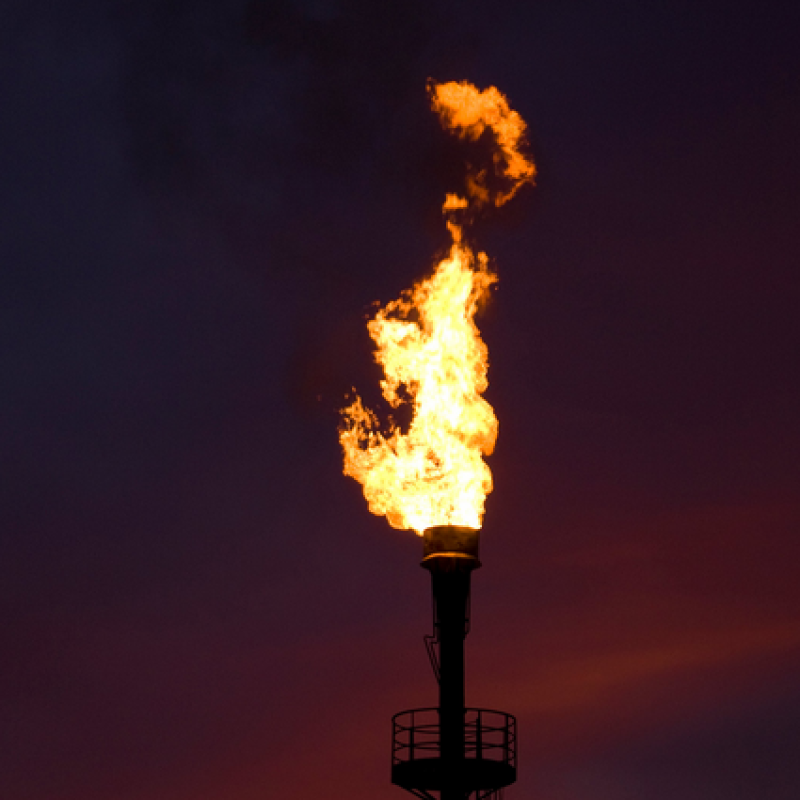Trump's Methane Rule Rollback Will Make More People Sick



On Tuesday, the Trump administration took the long-anticipated step of reversing an Obama-era rule that would’ve helped prevent leaking, venting, and flaring of methane from oil and gas operations. The rollback doesn’t just kill the final piece of Obama’s climate legacy—it could mean more air pollution entering vulnerable communities.
Certain Native American reservations—like the Fort Berthold and Navajo Nation—are located near oil and gas infrastructure. The same is true for Latinx communities in California. The 2016 Waste Prevention Rule would’ve helped address emissions spewing from these facilities and into communities.
This is not the case with the Trump administration’s final revision of the Bureau of Land Management (BLM) rule. The bureau won’t be pushing the oil and gas industry to better control the venting and flaring of methane from its operations on federal and tribal lands, which means other pollutants released alongside methane—including benzene and particulate matter—will continue to enter the air these communities breathe.
“You create a situation where people are trapped.”
“It’s these co-pollutants that, lots of times, people don’t pay as much attention to,” said Mustafa Ali, who used to head the Environmental Protection Agency’s environmental justice department, to Earther. “All of this comes out when you’re doing these extractive processes—and those are nasty.”
Some air contaminants released alongside methane can lead to the formation of smog. Long-term exposure to benzene, in particular, can mess with a person’s blood, immune system, and ultimately cause cancer, according to the Centers for Disease Control and Prevention. A toxic substance like toluene, on the other hand, affects the nervous system, per the CDC. Elevated levels benzene and formaldehyde, another dangerous air pollutant, have been detected near oil and gas production sites, reports the Environmental Defense Fund.
For some families, this has long been the unfortunate norm. And now, nothing’s changing all because the Trump administration found the methane rule would have “imposed costs exceeding its benefits.”
While this includes compliance costs on behalf of the federal and state government, the BLM is mostly looking out for its industry friends that’d have to update and improve their infrastructure to keep more methane (and everything that comes out with it) from billowing into the air. The original rule was set to remove up to 180,000 tons of methane and 267,000 tons of volatile organic compounds from the air per year.
“What’s most concerning for us, overall, is that BLM omitting these requirements without really considering these impacts on the public in the rollback and is really focused on ensuring a small increase in industry profit margins and is ignoring the cost to the public of this rollback,” said Rosalie Winn, an attorney at the Environmental Defense Fund, to Earther.
“The Trump administration risks the air our children breathe and at taxpayers’ expense.”
People of color already suffer disproportionately from asthma and are more likely to live near polluting industry. Some Navajo Nation communities, especially those in the Great Chaco Region of New Mexico, see oil and gas pads right outside their windows.
That’s, in part, why the state of New Mexico, along with California, filed suit Tuesday against the BLM’s rule.
“With this attempt to ax the Waste Prevention Rule, the Trump administration risks the air our children breathe and at taxpayers’ expense,” said California Attorney General Becerra, in a press release. “We’ve sued the administration before over the illegal delay and suspension of this rule and will continue doing everything in our power to hold them accountable for the sake of our people and planet.”
Litigation on this rule stretches back to last year when the Trump administration first moved to eliminate the proposal. Back then, the issue was around the legality of pushing the rule back. Courts flip-flopped between immediate implementation of the original rule and ignoring it until it was finalized. Now, states are suing over the final rule itself.
After all, peoples’ health and culture are at risk. As Ali, who now serves as the senior vice president of climate and environmental justice at civil rights group Hip Hop Caucus, put it: “People are trapped.”
“You’re being exposed to the flaring that’s going on, and you don’t have the resources to be able to afford the medicine,” Ali told Earther. “You don’t have the resources to be able to escape from the impact, and many communities also have a cultural tie to the land, so they’re not trying to escape. They’re trying to not be impacted from pollution.”
Tags
Who is online
38 visitors

Killing our grandchildren... for profit...